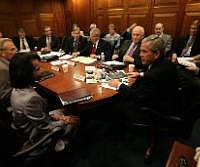No matter who is elected president today, the next leader of the United States should make reforming the U.S. national security system a top priority. That's the conclusion of the Project on National Security Reform (PNSR), a nonprofit and nonpartisan organization funded and supported by Congress, foundations, and the private sector. After more than a year spent analyzing case studies of how the U.S. government mitigated, prepared for, responded to, and recovered from various national security challenges, the PNSR research indicates that the U.S. national security system's performance is inconsistent. And America needs better to address the challenges it will face. To be sure, some case studies showed relatively clear, integrated strategy development and unified policy implementation. But others depicted flawed, divided, contradictory, and sometimes nonexistent processes for formulating strategy and putting it into action. Similarly, the system at times provided resources efficiently, but at others did so inadequately and tardily. These flawed responses recurred across issue areas and time, and the post-Cold War organizational reforms enacted thus far have not resulted in consistent improvements.
Global Insights: Voting for National Security

